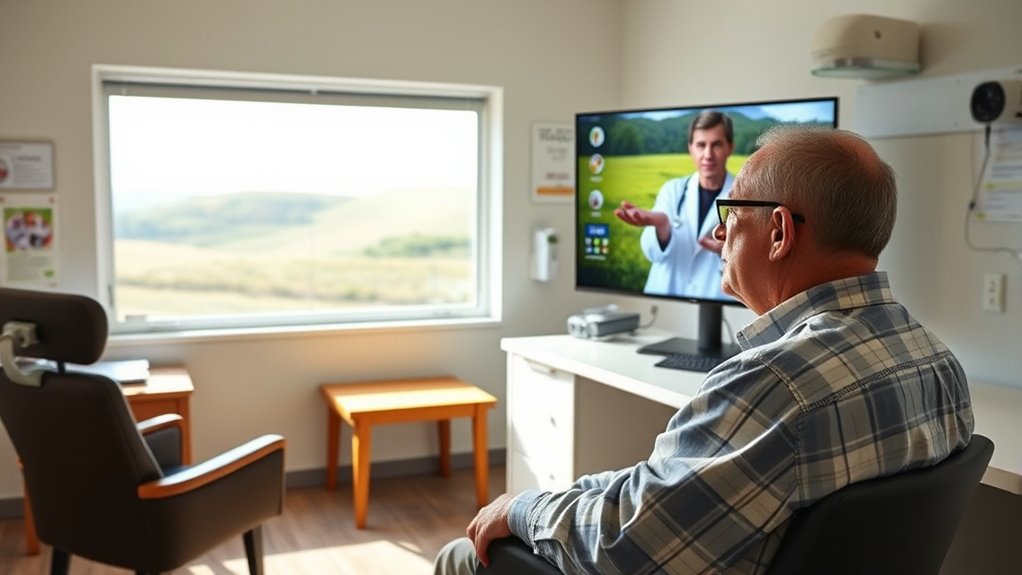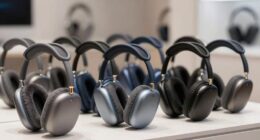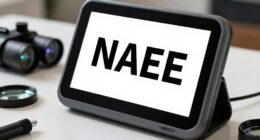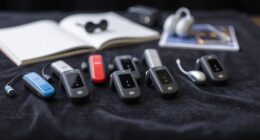The VA uses advanced telehealth technology to bring hearing care directly to rural veterans, overcoming distance barriers. Through secure video platforms, remote diagnostics, and specialized equipment, they deliver evaluations, fittings, and follow-up care right in your home. This approach reduces travel time, speeds up appointments, and improves overall access to quality hearing services. If you want to find out how these innovations make a difference, there’s more to explore ahead.
Key Takeaways
- The VA utilizes tele-audiology to connect rural veterans with hearing specialists through secure video and digital tools.
- Advanced remote diagnostic equipment and real-time data transmission ensure accurate hearing assessments for veterans at home.
- Telehealth reduces travel barriers and provides flexible scheduling, improving access to hearing care for underserved rural populations.
- Integration of AI and innovative diagnostics enhances the reliability and efficiency of remote hearing evaluations.
- Continuous support and follow-up via tele-audiology improve patient outcomes and satisfaction for veterans in remote areas.
How Tele-Audiology Works in the VA System
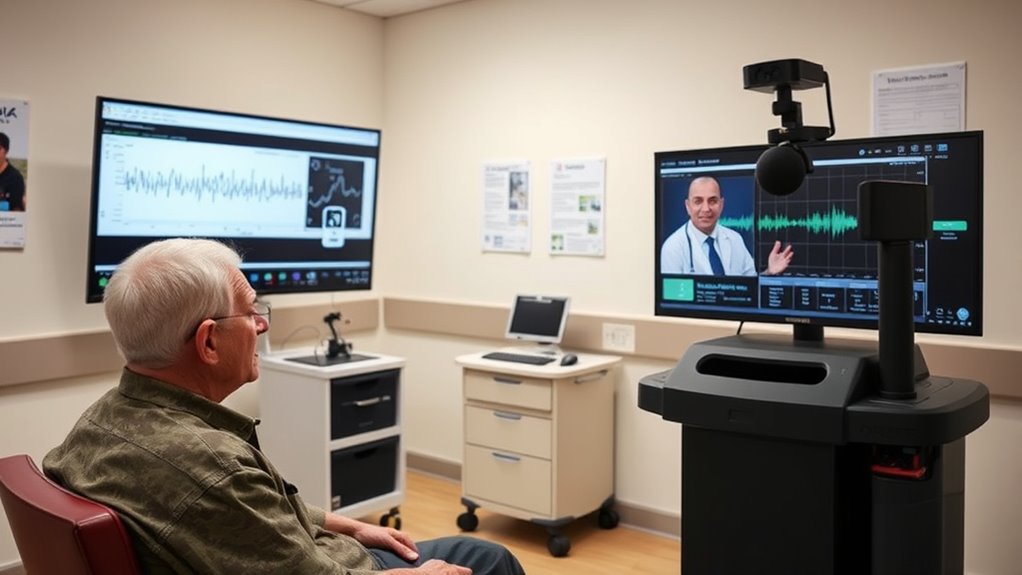
In the VA system, tele-audiology connects veterans with hearing care providers through secure video and digital communication tools. This setup enables remote diagnostics, allowing audiologists to evaluate your hearing without an in-person visit. During a hearing assessment, you’ll speak with a specialist who can guide you through tests and interpret results in real time. The process often includes remote data collection using specialized equipment, which sends detailed information directly to the provider. This way, you receive accurate diagnosis and personalized recommendations efficiently. Tele-audiology ensures that even if you’re in a rural area, you can access thorough hearing evaluations. It’s a seamless way to get high-quality care while saving time and overcoming geographical barriers. Additionally, advancements in telehealth technology continue to improve the reliability and accessibility of remote hearing services. These innovations support the integration of digital health tools that enhance patient engagement and care outcomes. Moreover, understanding the specialized equipment used in remote diagnostics helps ensure patients receive accurate assessments. Furthermore, ongoing research in machine learning algorithms is expected to further refine diagnostic accuracy in telehealth applications.
Overcoming Barriers in Rural Hearing Care
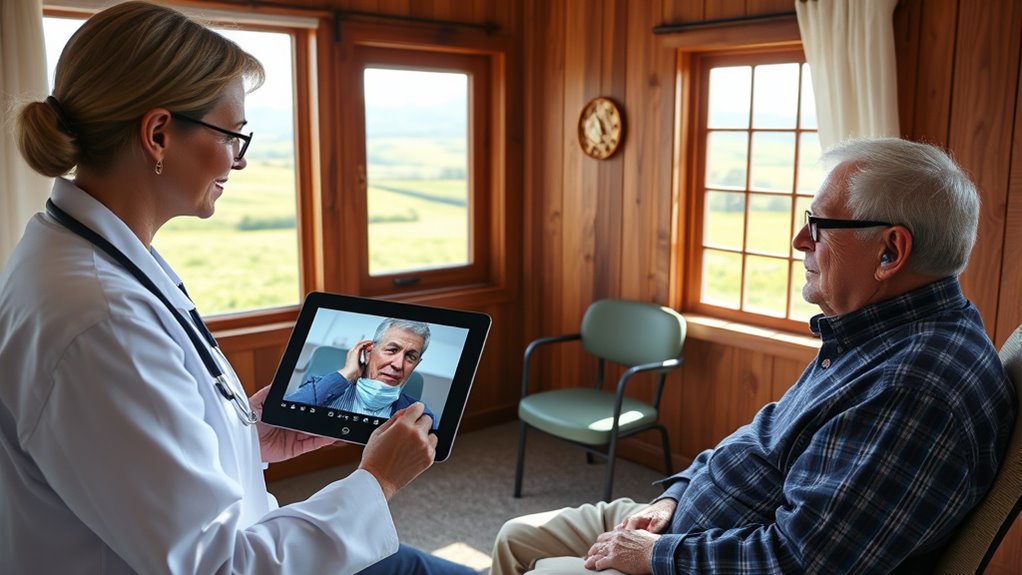
Rural veterans often face significant hurdles when accessing hearing care, from long travel distances to limited local providers. To reduce these barriers, the VA focuses on barrier reduction and access improvement through tele-audiology. Here are four key strategies:
Rural veterans face travel and provider shortages; VA improves access through tele-audiology strategies.
- Bringing specialist services directly to veterans’ homes via telehealth.
- Expanding provider networks to include remote audiologists.
- Offering flexible scheduling to accommodate rural veterans’ routines.
- Providing technical support to ensure smooth telehealth sessions.
These efforts make hearing care more accessible by minimizing travel and logistical challenges. Tele-audiology removes geographical barriers, allowing veterans to receive timely, quality care. This approach enhances access, empowering veterans to manage their hearing health effectively. Additionally, leveraging telehealth technology ensures that specialized audiology services are delivered efficiently and effectively to rural populations. Strengthening provider networks with remote audiologists further broadens access for veterans in underserved areas.
Technology and Equipment Used for Remote Assessments

Advancements in tele-audiology rely on a range of specialized technology and equipment designed for accurate remote assessments. These tools ensure you can deliver reliable hearing evaluations from afar. The core assessment technology includes calibrated audiometers, high-quality microphones, and secure video platforms. Remote equipment often features portable devices that transmit data directly to audiologists, enabling real-time analysis. To help you visualize, here’s a quick overview:
| Equipment Type | Function | Key Features |
|---|---|---|
| Portable Audiometers | Conduct hearing tests remotely | Calibration, wireless connectivity |
| Video Conferencing | Facilitate live interactions | Secure, HD video quality |
| Data Transmission Devices | Send assessment results instantly | Encryption, reliability |
| Headphones | Accurate sound delivery | Noise-canceling, comfort |
| Cloud Storage | Store and review assessment data | Accessibility, security |
This assessment technology ensures precise, efficient remote hearing evaluations. Additionally, ongoing advancements in telehealth technology are further enhancing the accuracy and reliability of remote assessments. Moreover, the integration of remote monitoring devices allows for continuous assessment and adjustment of hearing aids in real-time, supporting long-term management of hearing health.
Benefits for Veterans Living in Remote Areas
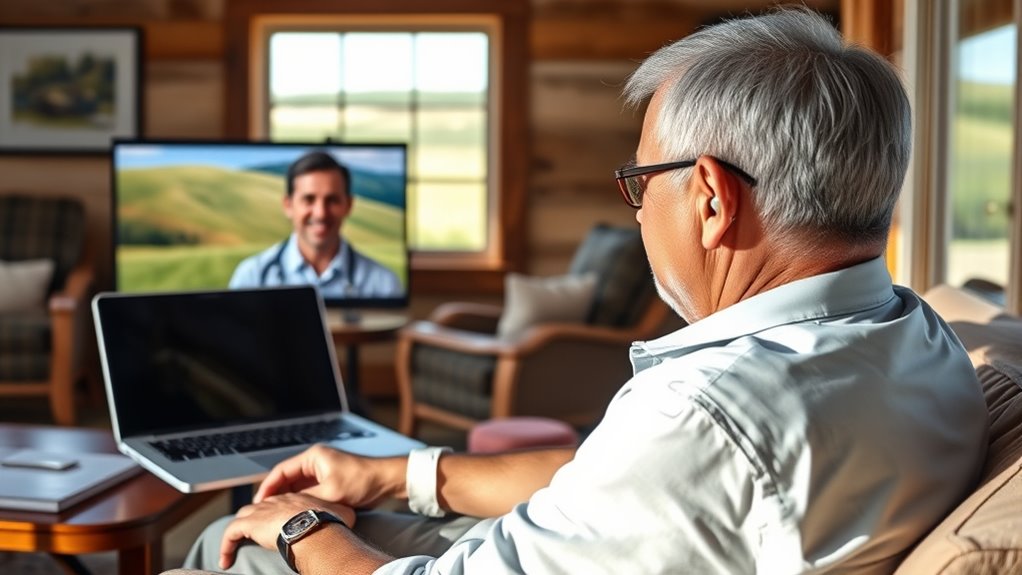
Tele-audiology transforms hearing care for veterans who live far from VA clinics, making essential services accessible regardless of location. This approach markedly improves accessibility, ensuring you receive timely evaluations and treatments without long travel. Benefits include:
- Reduced travel time and costs
- Faster appointment scheduling
- Consistent follow-up care
- Increased patient satisfaction due to convenience
These improvements mean you can access specialized hearing services from your home or local VA facilities. As a result, your ongoing care becomes more manageable, and you’re more likely to stay engaged with your treatment plan. The convenience and comfort of remote services boost patient satisfaction, helping you maintain better hearing health regardless of your remote location. Additionally, telehealth solutions support continuous care by enabling regular check-ins and adjustments without the barriers of distance. Insights from AI security developments underscore the importance of safeguarding patient data within telehealth platforms, ensuring trust and privacy for veterans utilizing these services. Incorporating digital health tools can further enhance the effectiveness of tele-audiology by providing real-time data and personalized care. Embracing these innovative solutions also promotes healthcare equity, ensuring all veterans have access to quality hearing health services.
Success Stories and Outcomes
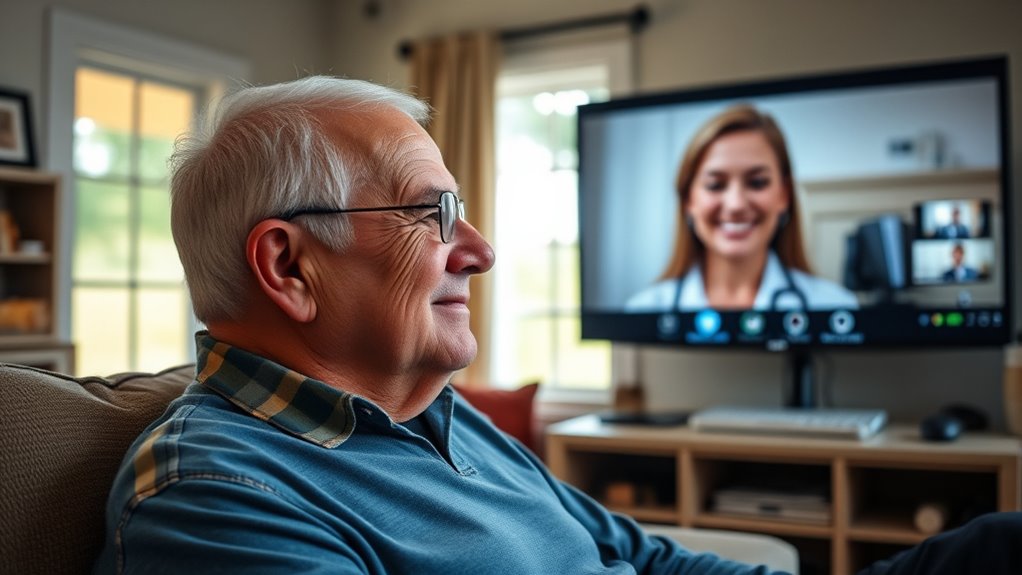
Many veterans have experienced remarkable improvements in their hearing health thanks to tele-audiology programs. These initiatives have led to increased hearing aid adoption, as veterans find it easier to access fitting and follow-up services remotely. Patients report high levels of satisfaction, appreciating the convenience and personalized care they receive without traveling long distances. Success stories highlight how prompt adjustments and ongoing support through telehealth options enhance hearing outcomes. Veterans often experience better communication and quality of life, reinforcing the value of these programs. Overall, the outcomes demonstrate that tele-audiology effectively bridges gaps in care, boosts hearing aid adoption rates, and fosters greater patient satisfaction, proving itself as an essential tool in delivering broad-based hearing healthcare to rural veterans. Proper beneficiary designation and strategic planning are crucial for maximizing these benefits.
Future Developments in Tele-Audiology Services
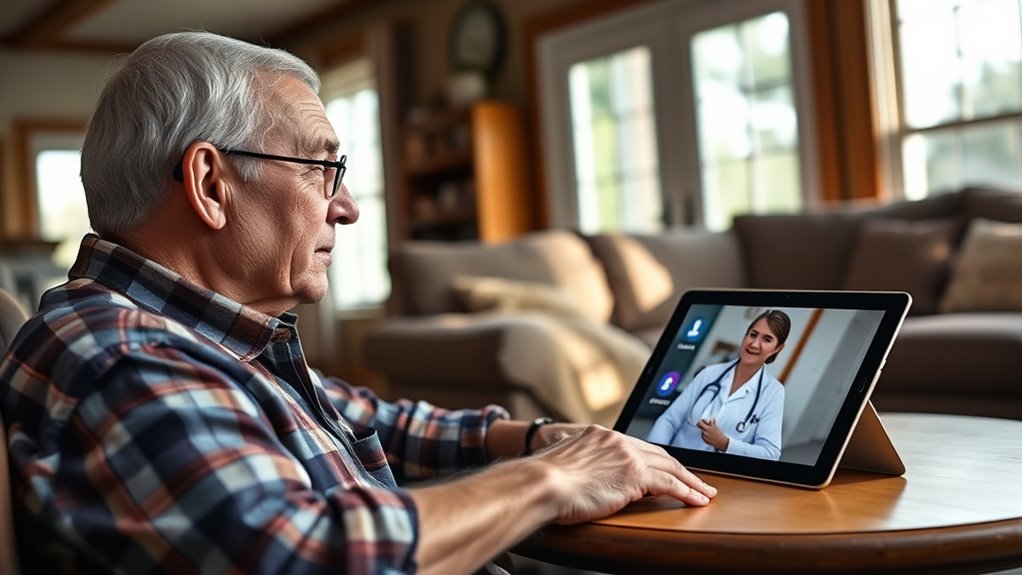
Building on the successes seen so far, future developments in tele-audiology are set to expand access, improve technology, and personalize care. Expect to see advancements in innovative diagnostics that enable earlier and more accurate detection of hearing issues. Policy evolution will likely streamline regulations, making telehealth services more flexible and widespread. Additionally, new tools will allow for more interactive and tailored patient experiences. As technology advances, you’ll benefit from real-time data transmission and AI-driven assessments that enhance diagnostic precision. Furthermore, integrating diagnostic modeling can improve the accuracy and reliability of remote evaluations. This integration supports the importance of a financial settlement time limit in ensuring timely and effective service delivery. To summarize:
- Integration of innovative diagnostics for quicker, more accurate results
- Streamlined policies that facilitate broader tele-audiology adoption
- Enhanced patient engagement through personalized care tools
- Use of AI and machine learning to refine assessments and treatment plans
Additionally, ongoing research into remote healthcare technology and telehealth infrastructure promises to further elevate the quality of tele-audiology services.
Frequently Asked Questions
How Does Tele-Audiology Ensure Accurate Hearing Assessments Remotely?
You can trust that tele-audiology guarantees accurate remote hearing assessments through meticulous remote calibration of equipment, which maintains testing consistency. Skilled technicians guide you through the process, guaranteeing proper setup and test administration. Their expertise helps address technical issues quickly, so your results are reliable. This combination of remote calibration and technician expertise guarantees precise assessments, even from a distance, bringing quality hearing care directly to your location.
What Training Do VA Staff Receive for Tele-Audiology Services?
Staff training is essential for delivering effective tele-audiology services. You’ll participate in specialized certification programs that focus on remote hearing assessments, technology use, and patient communication. These programs guarantee you stay current with telehealth best practices and equipment. By completing thorough training, you gain the skills needed to provide accurate evaluations and quality care remotely, making sure rural veterans receive the hearing support they deserve confidently and competently.
Are There Any Privacy Concerns With Remote Hearing Care?
Did you know that 85% of telehealth privacy breaches involve data encryption failures? Privacy concerns are valid with remote hearing care, but VA staff prioritize security by using robust data encryption and obtaining informed consent from patients. These steps help protect your personal information and ensure your hearing care remains confidential. By following strict protocols, they minimize risks and maintain trust in the remote treatment process.
How Quickly Can Veterans Access Tele-Audiology Appointments?
You can typically access tele-audiology appointments quickly, often within days, depending on your location and appointment availability. To schedule, you’ll use the VA’s appointment system, and ensuring your technology requirements are met—like a reliable internet connection and compatible device—is essential. Once everything is set, your access to hearing care becomes more convenient, especially if you’re in a rural area, reducing wait times and making care more immediate.
What Are the Costs Associated With Tele-Audiology for Veterans?
Imagine a world where hearing care costs less than expected. For veterans, tele-audiology offers a cost comparison that often reduces expenses, saving time and money. You typically won’t face high equipment expenses since VA provides necessary technology. While some minor costs might exist, overall, tele-audiology is a cost-effective way for you to access quality hearing care without hefty out-of-pocket expenses.
Conclusion
Imagine a world where distance no longer limits your access to hearing care. Tele-audiology gently bridges the gap, offering you the comfort of expert support without leaving your community. As technology continues to evolve, your journey to clearer hearing becomes smoother and more personalized. Embrace these advancements, knowing that improved hearing health is now within reach, quietly transforming your daily experiences and reconnecting you with what matters most.

